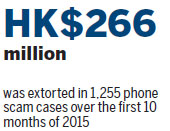Phone users warned of cyber attacks
Updated: 2016-01-21 07:56
By Shadow Li and Sylvia Chang in Hong Kong(HK Edition)
|
|||||||
IT experts have warned people to change their habits in using smartphones as the city experienced about 5,000 cyber attack cases last year - a 43 percent increase on the year before.
The Hong Kong Productivity Council (HKPC) on Wednesday revealed that attacks on mobile devices also showed significant growth of around 86 percent over 2014.
Over the first 10 months of 2015, phone scammers managed to extort a total of HK$266 million out of Hong Kong in 1,255 cases recorded.
According to the HKPC, cyber criminals tried to steal personal data or banking information through phishing and botnets - two major ploys that accounted for 40 percent and 39 percent, respectively, of all reported incidents last year.
The phishing cases had increased by 233 percent from 594 in 2014 to 1,978 in 2015.
Hong Kong Information Technology Federation Honorary President Francis Fong Po-kiu said scammers use the data stolen from mobile phones to plan their schemes, because today so many people use smartphones.

Echoing Fong, head of the Department of Information Technology of the Hong Kong Institute of Vocational Education (Chai Wan) Leung Ping-hung said smartphone users needed to be trained to view the borderless cyber world with caution because they greatly relied on their phones for personal information.
Not clicking on everything sent to their smartphones would protect users from most of the scams, Leung said.
Leung Siu-cheong, senior consultant for HKPC's Hong Kong Computer Emergency Response Team Coordination Centre, also alerted the public to the potential risk of using public Wi-Fi services.
"A public Wi-Fi service is never secure, especially when it is shared by multiple organizations," he said.
He warned the public against using public Wi-Fi services to transmit personal information or carry out monetary transactions.
Anyone with a smartphone can easily modify their hotspot sharing signal to pose as the government's Wi-Fi or any other official Wi-Fi of organizations, such as Ocean Park or Disney, Fong said.
When logging onto these Wi-Fi networks, it is only safe to browse webpages that do not require users to type in their personal information, he added.
Contact the writers through stushadow@chinadailyhk.com
(HK Edition 01/21/2016 page8)